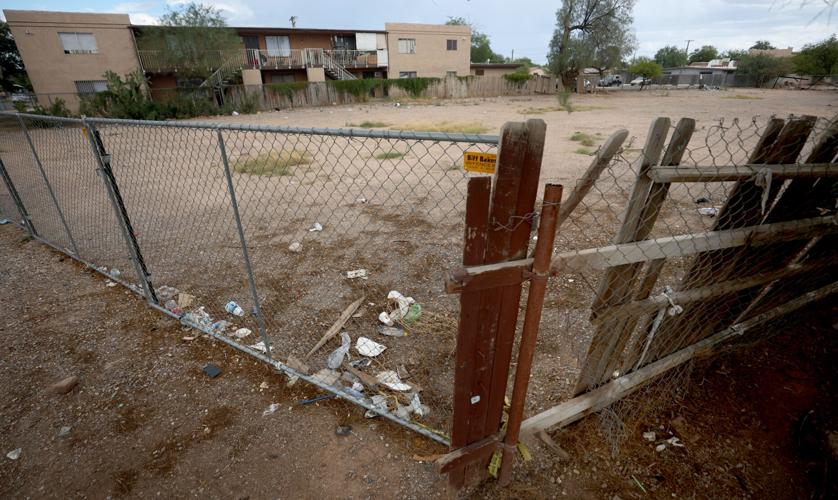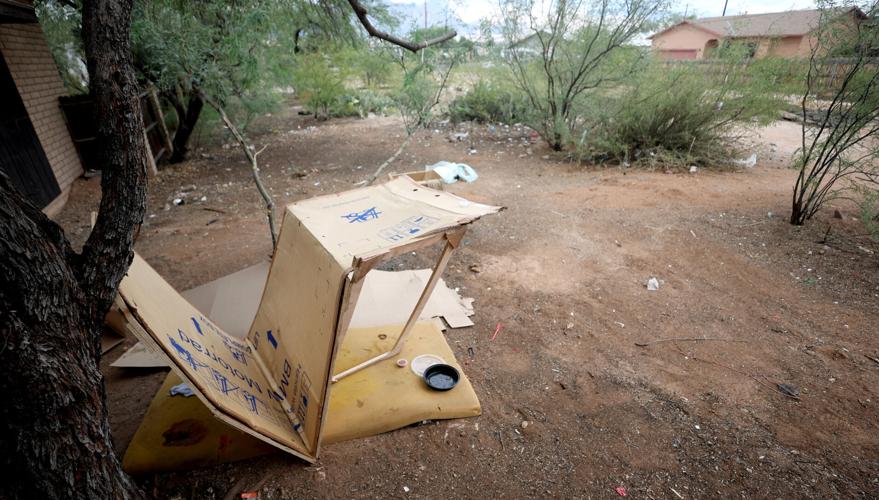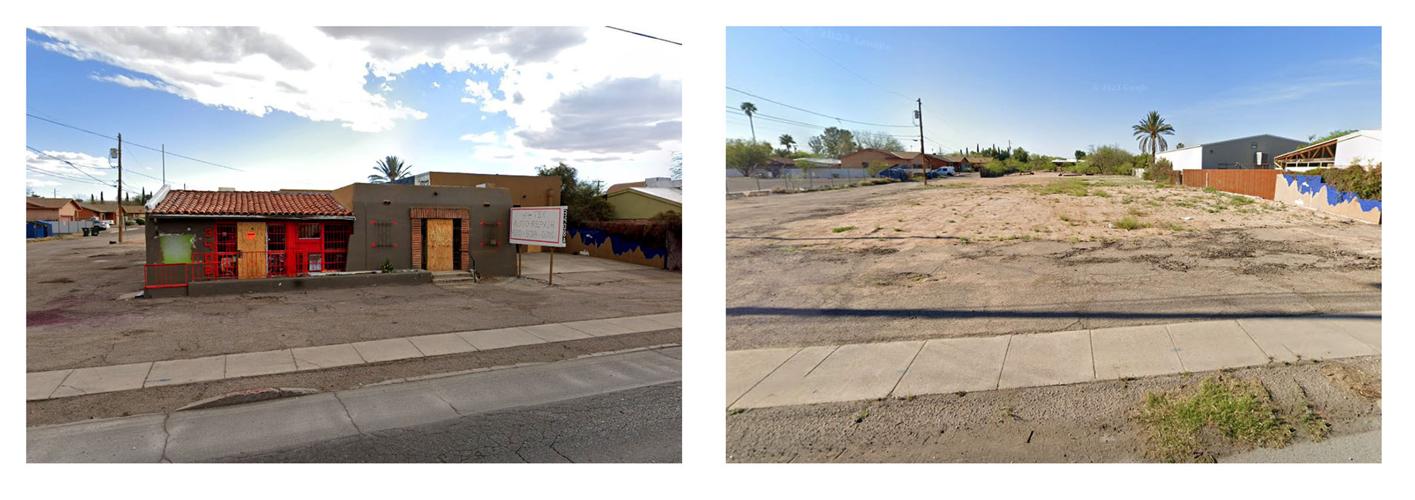Tucson is launching a new program to recover tens of thousands of dollars it’s spent to address health and safety violations at dilapidated and run-down properties across the city.
The move is part of a revamp of Tucson’s Vacant and Neglected Structures (or VANS) program used to get blighted houses up to code or eventually foreclose on them.
The neglected properties not only cause neighborhood eyesores but can attract and harbor criminal activity, city officials said. While Tucson has taken steps to make property owners abate the issues or fix them itself through code enforcement and legal measures, it’s not recouped most of the costs of the repairs made with taxpayer dollars.
City Council Member Kevin Dahl asked for an update to the VANS program in May, leading to a unanimous resolution from the council for staff to come back with updated plans, including an abatement lien foreclosure process. The council approved those plans last week.
“There’s a lot of these vacant and neglected structures, old homes and businesses that are run down. They become a focus of bad activity,” Dahl said. “It’s a constant struggle, especially with out-of-town owners, to make sure that they are maintained.”
Ronni Kotwica, former Palo Verde Neighborhood Association president, said she’s been instrumental in the demolition of at least nine nuisance properties in the midtown neighborhood.
Overgrown vegetation, boarded-up windows and accumulated trash often accompany the properties, but Kotwica said she’s seen squatters flock to the neglected houses while drug use and dangerous shoddy electrical work ensue.
“It may be ugly, but what it’s doing is it’s the broken window syndrome,” she said. “If you have a house that has broken windows and weeds and garbage … it’s going to go throughout the whole block that you’re living on, and things over time are going to deteriorate.”
One of those properties included a commercial building along East Grant Road that is still experiencing “trespassing, homeless camps, refuse, accumulation of vegetation,” according to Code Enforcement’s Inspections Supervisor Laurie Pumphrey.
The property was demolished by the city through the VANS program last year. The owner owes the city nearly $80,000 in six unpaid liens, Pumphrey said.
John Cartwright, the owner of Iron Horse Motorcycles that abuts the now vacant lot, said criminal activity has somewhat subsided since the property was demolished. His business has experienced a shattered storefront window, some stolen motorcycle parts and human excrement in the parking lot.
Cartwright still sees some nuisance activity in the vacant lot concentrated under the overgrown trees on the west side of the property, but for the most part, conditions have improved since the demolition.
“There’s less drug use since the buildings were gone because I think people were going in there and were able to hide,” he said.
Recurring nuisance issues at neglected properties have increased in recent years, said Shilpa Hunter-Patel, principal assistant city attorney.
“In the past, we’ve not had a significant amount of properties that have remained vacant or neglected for long periods of time,” she said. “What we’re seeing is a large increase in that … we have recurring problems with people reentering that property because the owner is not taking control of the property.”
Kotwica said her experience with the VANS program is a long, drawn-out process with “too much leniency” from city officials and the judges in charge of giving property owners more time to make abatements.

The commercial property at 3408 E. Grant Rd. was deemed a health and safety risk and demolished in 2022. The property owner owes Tucson nearly $80,000 in outstanding liens. The now empty lot still sees trespassing, excess refuse and accumulation of vegetation, according to the city.
The VANS process will work faster under the new guidelines, Hunter-Patel said, as the city assigns schedules to have delinquent property owners pay the liens they owe or foreclose on the properties.
“Either we recover the money, or we’re able to motivate a change of the property ownership, potentially to someone else who acquires the property and takes care of it appropriately,” she said.
The new VANS process
When Tucson’s code enforcement team addresses a blighted house, there’s a process for giving the property owner the chance to fix the issues themselves, or eventually issue citations and a court order that can end in a pricey demolition.
But the liens the city places on properties after spending money to fix them often aren’t collected until the property changes hands.
“We would lien the property after the demolition, but we would not necessarily proactively initiate any kind of action to recover those costs in a timely manner. Now, we will be doing that,” Hunter-Patel said.
Tucson took a look at Phoenix’s process for collecting liens on vacant structures. Phoenix has recouped about $3 million, or 85% of its outstanding liens on vacant or neglected structures in the eight years since they started a program to foreclose on the properties, according to the city.
While the council gave the go-ahead to initiate the new VANS process last week, the city already has the tools to foreclose on vacant structures through state statutes. Until now, Tucson hasn’t utilized them.
The city is taking Phoenix’s lead by developing a process with a more detailed set of steps to keep better track of the liens it places on properties that don’t abate the problems code enforcement identifies. Tucson will issue a pre-notification letter requesting property owners to address a complaint within 30 days. If the issues aren’t addressed after a series of site inspections and follow-up notices, the city will proceed with a court process and invoices for liens owed and eventually move to foreclose on the property and auction it off if the owner doesn’t pay up.
Part of the VANS program changes is identifying the total outstanding liens on neglected structures the city needs to collect — an unknown number since the city started paying for VANS abatements in 2016. Between 2009 and 2016, the city conducted over 60 demolitions and used federal Community Development Block Grant funding to complete the process. Since then, Tucson’s used its own, non-grant dollars to carry out neglected house rehabilitations.
The move to recoup VANS dollars through foreclosure isn’t intended to penalize homeowners with overgrown weeds, Hunter-Patel said, but to address properties that have posed health and safety issues over the years.
“It’s not the city’s intention to foreclose on properties … where the residents are clearly occupying the property and need that home for their own presence,” she said. “What we are saying is that we’re going to start prioritizing properties that have had significant code enforcement actions … not just the dollar amount, but also, if the property is in a location where it has repeat issues.”
Many property owners pay up when issued a notice of intent to foreclose, Hunter-Patel said, but the new program will target repeat violators by actually going through with the foreclosure process.
Tucson plans to assemble a “proactive team to identify foreclosure opportunities,” to recoup its costs, Hunter-Patel said. The new team includes a VANS program coordinator, two code enforcement inspectors and a code enforcement administrative assistant at an estimated cost of $367,350. City Manager Michael Ortega said the city will use its vacancy savings, or money saved from vacant job openings, to fund the salaries.
The money collected from the VANS abatement process will be placed in a revolving fund for future needs of the program. But the ultimate goal is to stymie criminal activity in areas like the empty lot on Grant Road by auctioning off the property so a new owner can secure it.
“We’ve streamlined some of that with the new procedures so that we can make it clear to the owners that this is serious, you have to take care of your property. If you can’t, sell it, let someone else take care of it,” Dahl said. “There’s too much of a need for housing in Tucson for us to have abandoned, derelict houses in our neighborhoods.”
Watch now: Tucson will start a new process to foreclose on houses that don't pay the city back for fixing neglected or vacant properties. Video by Nicole Ludden/Arizona Daily Star.






